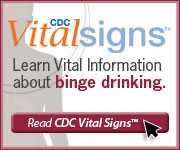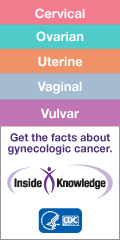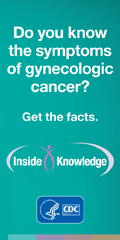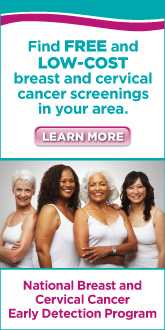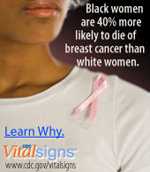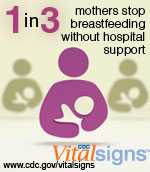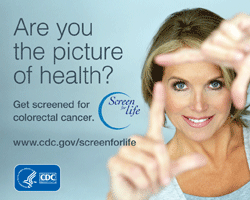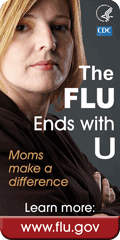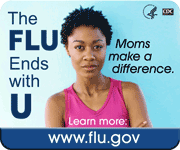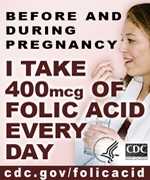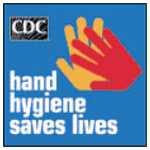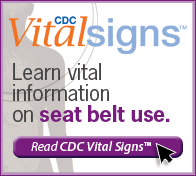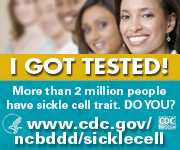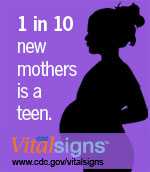Badges and Buttons
Social media allows you an opportunity to raise awareness about health issues important to women. Add a button or badge to your site or page. Each badge or button focuses on staying healthy and the prevention of disease, illness, and disability.
Binge Drinking for Females
New estimates show that binge drinking* is a bigger problem than previously thought. More than 38 million US adults binge drink, about 4 times a month, and the largest number of drinks per binge is on average 8. This behavior greatly increases the chances of getting hurt or hurting others due to car crashes, violence, and suicide.
Copy and paste the code to embed this button in your Web site, social network profile, or blog.
Breast and Gynecological Cancers
The Inside Knowledge: Get the Facts About Gynecologic Cancer campaign raises awareness of the five main types of gynecologic cancer: cervical, ovarian, uterine, vaginal, and vulvar. It encourages women to pay attention to their bodies and know what is normal for them, so they can recognize the warning signs of gynecologic cancers and seek medical care. When gynecologic cancers are found early, treatment is most effective.
Copy and paste the code to embed this button in your Web site, social network profile, or blog.
CDC’s National Breast and Cervical Cancer Early Detection Program (NBCCEDP) provides access to breast and cervical cancer screening services to underserved women in all 50 states, the District of Columbia, 5 U.S. territories, and 12 tribes.
Copy and paste the code to embed this button in your Web site, social network profile, or blog.
Black women are 40% more likely to die of breast cancer than white women. Learn why.
Copy and paste the code to embed this button in your Web site, social network profile, or blog.
Breastfeeding
In the US, most babies start breastfeeding, but within the first week, half have already been given formula, and by 9 months, only 31% of babies are breastfeeding at all. The Baby- Friendly Hospital Initiative describes Ten Steps to Successful Breastfeeding that have been shown to increase breastfeeding rates by providing support to mothers.
Copy and paste the code to embed this button in your Web site, social network profile, or blog.
Colorectal Cancer
CDC’s multiyear, multimedia Screen for Life: National Colorectal Cancer Action Campaign informs men and women aged 50 years and older about the importance of having regular colorectal cancer screening tests. Screening tests help find precancerous polyps so they can be removed before they have a chance to turn into cancer, thus preventing the disease. Screening also can find this cancer at an early stage, when treatment is most effective.
Copy and paste the code to embed this button in your Web site, social network profile, or blog.
Flu
Influenza (the flu) is a contagious respiratory illness caused by influenza viruses. It can cause mild to severe illness, and at times can lead to death. Some people, such as older people, young children, and people with certain health conditions, are at high risk for serious flu complications. The best way to prevent the flu is by getting vaccinated each year.
Copy and paste the code to embed this button in your Web site, social network profile, or blog.
Folic Acid
If a woman has enough folic acid in her body before and during pregnancy, it can help prevent major birth defects of the baby’s brain and spine. Women need 400 micrograms (mcg) of folic acid every day.
Copy and paste the code to embed this button in your Web site, social network profile, or blog.
Hand Washing
In the United States, hospital patients get nearly 2 million infections each year. That’s about 1 infection for every 20 patients. Infections that patients get in the hospital can be life-threatening and hard to treat. Hand hygiene is one of the most important ways to prevent the spread of infections.
Copy and paste the code to embed this button in your Web site, social network profile, or blog.
HIV/AIDS
Take Charge. Take the Test.™ focuses on African American women. Young African American women can take charge of their health by knowing their HIV status — and by taking steps to protect themselves from HIV. This campaign, which was first piloted in Cleveland and Philadelphia, reached thousands of African American women with this important and empowering health message. http://www.hivtest.org/takecharge/
Copy and paste the code to embed this button in your Web site, social network profile, or blog.
Pregnancy and New Moms

Get free text messages with tips for a healthy pregnancy and baby. Text4baby is a free service that provides pregnant women and new moms with free text messages each week on pregnancy and baby care. These messages are timed to a woman’s due date or the baby’s date of birth.
Copy and paste the code to embed this button in your Web site, social network profile, or blog.
Seat Belt Safety
Motor vehicle crashes are the leading cause of death for people age 5 – 34. Adult seat belt use is the single most effective way to save lives and reduce injuries in crashes. The percentage of adults who always wear seat belts increased from 80% to 85% between 2002 and 2008. Even so, 1 in 7 adults do not wear a seat belt on every trip.
Copy and paste the code to embed this button in your Web site, social network profile, or blog.
Sickle Cell
Sickle cell disease (SCD) is a group of inherited red blood cell disorders. In SCD, the red blood cells become hard and sticky and look like a C-shaped farm tool called a “sickle.” People with SCD can live full lives and enjoy most of the activities that other people do. If you have SCD, it’s important to learn how to stay as healthy as possible.
Copy and paste the code to embed this button in your Web site, social network profile, or blog.
Skin Cancer
Your natural skin color is great the way it is! Indoor tanning before you’re 35 increases your risk of melanoma by 75%. Young women are getting skin cancer more often. The risk is real! Melanoma—the deadliest kind—is the third most common cancer in people from 15 to 39. You can get melanoma in your eyes.
Copy and paste the code to embed this button in your Web site, social network profile, or blog.
Smoking
From those of us at Smokefree Women: Congratulations! You are taking the first step to quitting cigarette smoking. We wrote this guide with the help of ex-smokers and experts. It can help you prepare to quit and support you in the days and weeks after you quit.
Copy and paste the code to embed this button in your Web site, social network profile, or blog.
Celebrate Moms for Being Smoke Free!
This Mother’s Day, the Centers for Disease Control (CDC) encourages you to congratulate and give the gift of thanks to those mothers who have quit smoking and to offer support to those who are trying to quit.
Copy and paste the code to embed this button in your Web site, social network profile, or blog.
Teen Pregnancy
More than 400,000 teen girls, aged 15-19 years, give birth each year in the US. Having a child during the teen years carries high costs–emotional, physical, and financial–to the mother, father, child, and community. Parents, educators, public health and medical professionals, and community organizations all have a role to play in reducing teen pregnancy.
Copy and paste the code to embed this button in your Web site, social network profile, or blog.
- Page last reviewed: April 28, 2015
- Page last updated: April 28, 2015
- Content source:


 ShareCompartir
ShareCompartir
